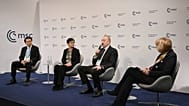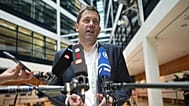Belarus' authoritarian leader has accused NATO of aggressively poisitioning forces along its Polish and Lithuanian borders.
Belarusian autocratic leader Alexander Lukashenko has again accused NATO of aggressively positioning forces along its borders with Poland and Lithuania and threatened both EU states with counter-sanctions.
 ADVERTISEMENT
ADVERTISEMENT
 ADVERTISEMENT
ADVERTISEMENT
Lukashenko, who has ruled the 9.5-million nation in Eastern Europe with an iron fist since 1994, blamed the West for fomenting demonstrations against him in the hope of turning Belarus into a "bridgehead against Russia.''
"They want to topple this government and replace it with another one that would ask a foreign country to send troops in support,'' he said on Friday.
"They want our market to sell their products.''
NATO has rejected previous such claims by Lukashenko as "baseless".
NATO Secretary-General Jens Stoltenberg said this week that the Belarusian leader tries to conjure up the image of outside forces threatening Belarus as an excuse for his crackdown on the opposition, which has seen hundreds of protesters beaten by police.
NATO flew four nuclear-capable B-52 bombers over all 30 member states on Friday in a major aerial exercise, which involved many of the states' airforces.
In addition, the idea that Belarus' ailing Soviet-style economy would be seen as a beacon for Western exporters seems to defy current economic realities.
Protests have been fuelled by growing weariness about Lukashenko's 24-year rule, his cavalier dismissal of the coronavirus pandemic and a bruising economic fallout from the outbreak in a country where living standards were already sinking.
The 65-year-old leader threatened to retaliate against neighbours Poland and Lithuania, who pushed strongly for the European Union's sanctions against his government.
Lithuania also hosted the main opposition challenger in the vote, Sviatlana Tsikhanouskaya, who sought sanctuary there after the vote, after she was pressured by Belarusian authorities.
Lukashenko said Belarus would strike back by halting imports via Lithuanian ports and force its western neighbours to use longer routes via the Baltics and the Black Sea in their trade with Russia and China.
"Let's us see who will get scared first, we will show them sanctions,'' he said.
"I have ordered the government to divert all trade flows away from Lithuanian ports. They have grown spoiled, and now we will show them their place.''
"They were doing transit via us, but now they will need to go over the Baltics or the Black Sea to trade with Russia.''
Lithuanian Prime Minister Saulius Skvernelis responded in a Facebook statement, saying that if Lukashenko fulfils his threat it will mostly hurt Belarus and its citizens.
Lukashenko has repeatedly sought to cast the protests that are demanding his resignation as part of a Western plot against Russia, in a bid to secure Moscow's support.
Russian President Vladimir Putin warned on Thursday that he stands ready to send police into Belarus if protests turn violent but he said no such action was needed yet.
As NATO was flying nuclear-capable bombers over its member states, Russia has been holding large naval exercises near the US state of Alaska, its biggest since the Soviet era, the Associated Press reported.
The wave of protests that came after election officials declared Lukashenko had won a sixth term in a landslide in the August 9 presidential election has cast an unprecedented challenge to his rule.
Both the European Union and the United States said the vote was neither free nor fair.














